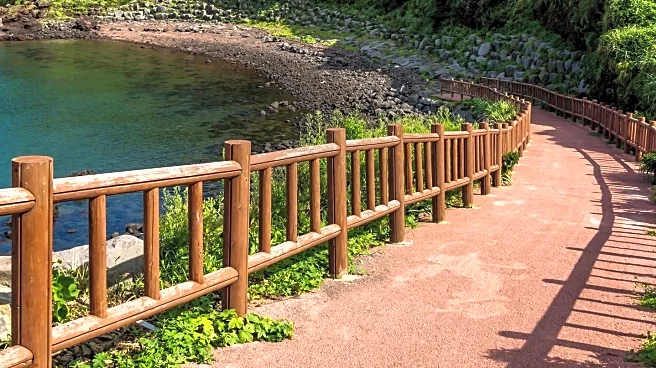What's Happening?
The haenyeo, traditional women divers of Jeju Island, South Korea, are facing challenges due to environmental changes and a declining number of practitioners. Historically, these divers have been integral to the island's economy, harvesting marine life without oxygen tanks. However, climate change has led to warming waters, affecting marine biodiversity and reducing harvest yields. Despite these challenges, the haenyeo culture has been recognized by UNESCO and the FAO for its sustainable practices and cultural significance. Efforts are underway to preserve this heritage, including government support for the divers' welfare and cultural activities.
Why It's Important?
The recognition of the haenyeo culture highlights the importance of preserving traditional practices that contribute to sustainable marine management. As climate change impacts marine ecosystems globally, the haenyeo's practices offer insights into resilience and adaptation. The support from international organizations and local government underscores the value of cultural heritage in fostering community identity and environmental stewardship. This recognition may inspire similar efforts in other regions facing environmental challenges, promoting sustainable practices and cultural preservation.
What's Next?
The Jeju government is investing in the welfare of haenyeo divers, including medical support and financial allowances. Efforts to train new divers and promote cultural activities are ongoing. The government aims to balance preserving the haenyeo tradition with adapting to environmental changes. Continued international recognition and local support are crucial for sustaining this cultural heritage. The haenyeo community's proactive measures, such as regulating harvests and combating invasive species, will be vital in maintaining marine biodiversity and supporting the divers' livelihoods.
Beyond the Headlines
The haenyeo tradition offers a unique perspective on gender roles and community dynamics, as women have historically been the primary breadwinners in Jeju. The cultural recognition not only preserves a way of life but also empowers women in the community. The haenyeo's practices emphasize interdependence and respect for nature, providing a model for sustainable living. As global interest in environmental conservation grows, the haenyeo's story may inspire broader discussions on integrating cultural heritage into modern sustainability efforts.









